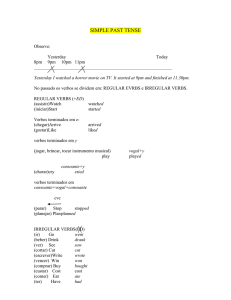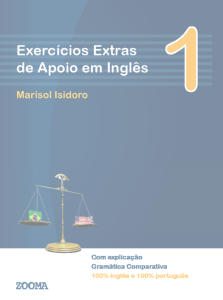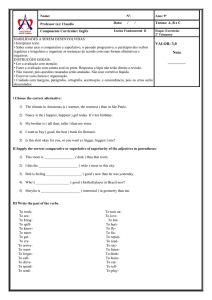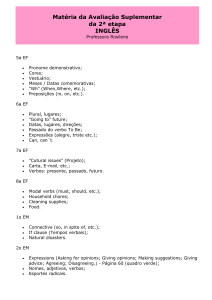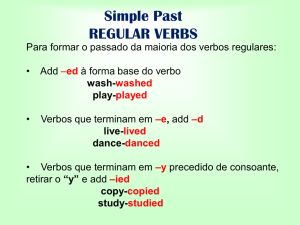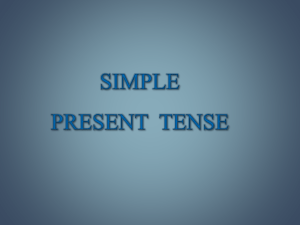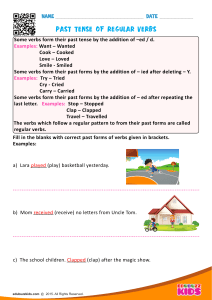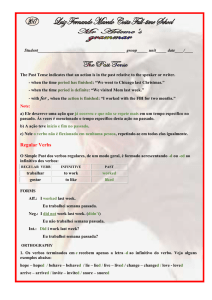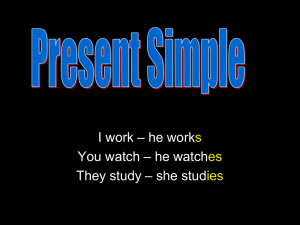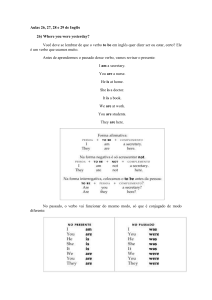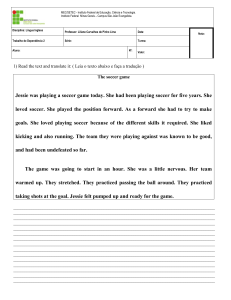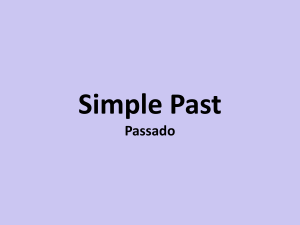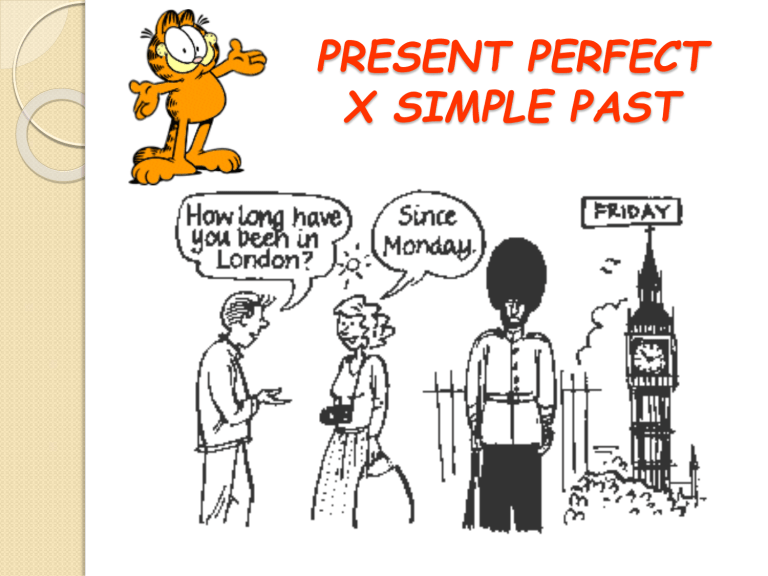
PRESENT PERFECT
X SIMPLE PAST
SIMPLE PAST
Uso
Fala de uma ação que já ocorreu, ou seja, algo
finalizado, acabado.
We worked last night.
(Nós trabalhamos noite passado.)
Forma 1
O passado simples tem
a seguinte forma:
Verbos Regulares: são
aqueles que preservam
a forma do infinitivo
apenas
com
o
acréscimo do sufixo ed no final:
work
worked
play
played
Forma 2
Existem alguns verbos que não
seguem a regra anterior, são o
verbos irregulares, pois a sua forma
sofre ou não alguma alteração no
passado:
Forma 3
Tanto os verbos regulares quanto irregulares usam o
auxiliar did, na forma negativa e interrogativa para
todas a pessoas:
The car stopped at the traffic light.
The car did not stop at the traffic light.
I worked yesterday.
Did you work yesterday?
Apenas o verbo to be não usa auxiliar:
I was at home last night.
I was not at home last night.
You were at school yesterday.
Were you at school yesterday?
Presente Perfeito
Uso
Nos fala de algo que está no passado, mas
com relação direta ao presente:
We have worked a lot today.
(Nós trabalhamos muito hoje.)
Forma
No presente perfeito é formado por dois verbos: o
1º é o verbo é o auxiliar have (para I/You/We/They)
e has (para He/She/It), o 2º é o particípio.
Present perfect tense
We form the present perfect tense
with have / has + past participle.
I
You
We
They
have
eaten
an apple.
He
She
It
John
has
eaten
an apple.
Example (1)
We use the Present Perfect tense to
show the result of an action.
e.g. (a) Ben is eating a chicken leg.
(b) Ben has eaten a chicken leg.
Example (2)
We cannot use the Present Perfect tense
with adverbs of time,
e.g. yesterday, two weeks ago.
I have done my homework yesterday.
I did my homework yesterday.
Practice (1)
Present
Past
made
have / has made
1 do
did
have / has done
2 tidy
tidied
have / has tidied
3 eat
ate
have / has eaten
4 draw
drew
have / has drawn
5 take
took
have / has taken
e.g. make
Present perfect
6 paint
painted
have / has painted
7 write
wrote
have / has written
Already / yet
In the Present Perfect tense, we use
yet with questions or negative (no)
sentences.
Have you eaten the apples yet? (question)
‘Yet’ goes at the END of the sentence or question.
No, I haven’t eaten the apples yet. (negative)
Already / yet
In the Present Perfect tense, we use
already with positive (yes) sentences.
Have you eaten the apples yet? (question)
Yes, I’ve already eaten the apples. (positive)
‘Already’ goes in the MIDDLE or at the END of the sentence.
or Yes, I’ve eaten the apples already. (positive)
once / twice
In the Present Perfect tense, we use once
/twice to express frequency.
How many time have you given flowers to the
pop star ? (question)
I’ve given flowers to a pop star once only.
‘once’ goes at the END of the sentence.
or I’ve given flowers to a pop star only once.
ever / never
In the Present Perfect tense, we use ever
(question) and never (answer) to express
frequency.
Have you ever celebrated the Cheung Chau Bun
Festival ? (question)
No,I’ve never celebrated the Cheung Chau Bun
Festival. (answer)
Already / yet
e.g.
do
Has
done
yet
______
Mary _______
her homework _____?
already .
has done
Yes, she __________her
homework _______
or
has already done
Yes, she _________________her
homework.
Already / yet
e.g.
eat
Has Ben _______
yet ?
eaten his hamburger_____
______
hasn’t / has not eaten his hamburger
No, he ___________________
yet
_______
.
Practice
1 (do)
Has
done the washing
________
Mum ________
yet
_______
?
has already done the washing.
Yes, she _______________
2 (sweep)
swept the
Have
________
Sally and Joe ________
floor _______
?
yet
haven’t swept the floor
No, they____________
yet .
_____
Practice
3 (throw)
Have
thrown away the rubbish
________
you ________
_______
yet
?
Yes, I ’ve
______________
/ have thrown away the rubbish
_______
already .
4 (write)
Has
written the letter
________
Mark ________
yet
_______
?
hasn’t written the letter _____
yet .
No, he ____________
Practice
5 (visit)
visited
many times have you ________
How ____________
Hong
Kong Disneyland ?
have visited
twice
I ______________
there _________.
6 (watch)
Have you ______
_______
_______ birds in Mai Po
ever watched
Wetlands ?
watched birds in Mai
have never
No, I ____________
________
Po Wetlands.
Revision :
Present Perfect Tense
Part(2)
Present perfect tense
We use the present perfect tense to talk
about actions that started in the past and
continue to the present.
e.g. I’ve grown flowers for two years.
Now is 2005.
2003-now
Present perfect tense
We use the present perfect tense with
since and for to say how long an action
has lasted.
I have played the piano since 2000.
I have played the piano for five years.
Present perfect tense
Since Usamos o since para indicar o ínicio da ação (desde). Algumas
expressões de tempo usadas com since (desde): 8 o’clock (8
horas), 1998, Monday (segunda-feira), Christmas (o Natal), May 12 (12
de maio), lunchtime (a hora do almoço), April(abril), they were at
school (que eles estavam na escola).
We use since with the present perfect
tense to refer to the starting point of
an action.
I have studied at this school since 2000.
starting time
2000
Now
2005
(2000 is a point of time, not a period of time.)
Present perfect tense
For Usamos o for para indicar um período de tempo (há, faz). Algumas
expressões de tempo usadas com for: two hours (duas horas), a week (uma
semana), 20 minutes(20 minutos), 50 years (50 anos), five days (cinco dias), a
long time (muito tempo),six months (seis meses), ages (décadas, anos, muito
tempo)
We use for with the present perfect tense
to refer to a period of time.
I have studied at this school for five years.
Now
2005
since 2000
starting
time
period of time
(for five years)
( ‘Five years’ is a period of time, not a point of time.)
Practice (1)
Use since or for.
1 I have had piano lessons _____
for ten years.
since 2003.
2 Peter has collected stamps _____
since last month.
3 Amy has grown flowers _____
for two
4 My brother has played football _____
years.
for
5 John and Jenny have been friends _____
eight months.
since 2000.
6 They have done ballet _____
since 1996.
7 My father has driven his car _____
How long …?
have
you
has
he
she
How long
I
have
He
She
has
done ballet?
collected stickers?
learnt the piano?
since 2001.
done ballet
collected stickers
learnt the piano for one year.
How long have these children done their
hobbies?
paint pictures, 2003
A: How long have you painted pictures?
B: I have painted pictures since 2003.
grow flowers, six months
A: How long have you grown flowers?
B: I have grown flowers for six months.
make handicrafts, March
A: How long have you made handicrafts?
B: I have made handicrafts since March.
play the violin, five years
A: How long have you played the violin?
B: I have played the violin for five years.
Kate
do karate, last month
A: How long ___________________
has Kate done karate ?
has done karate since last month
B: She _____________________________
.
James
collect coins, two years
A: How long _____________________
has James collected coins ?
B: He _______________________________
.
has collected coins for two years
Shirley
collect seashells, last summer
A: How long ____________________________?
has Shirley collected seashells
B: She ________________________________
has collected seashells since last summer .
Past tense & Present perfect tense
Past Tense
actions that
happened in
the past
e.g. I sang yesterday.
Present Perfect Tense
actions that started
in the past and
continue to the present
e.g. I’ve sung for two
hours.
actions that have just
finished
e.g. I’ve just sung a
famous song.
Past tense & Present perfect tense
Past Tense
We know the
specific point of
time of the
action.
e.g. I drew a picture
last night.
Present Perfect Tense
We do not know the
time of the action.
e.g. I’ve drawn a picture
already.
Past tense & Present perfect tense
Past Tense
verb - 1 word
e.g. I started playing
the violin in 2000.
Hint words:
yesterday,
last night,
last Sunday,
last year, ago,
in 2000
Present Perfect Tense
verb - 2 words
e.g. I’ve played the violin
since 2000.
Hint words:
since, for, already, just,
yet, ever
Practice (2)
e.g. I _______
made a dress two weeks ago. (make)
1 I ______________
have lived
in Hong Kong since 1990.
(live)
bought our house in 2000. (buy)
2 My parents _______
has taught at my school
3 Miss Lee ___________
for two years. (teach)
visited his uncle one month ago. (visit)
4 Tom _______
have been friends
5 Polly and Dolly __________
since last year. (be)
has slept
6 The baby __________
for four hours. (sleep)
Have a great week!
See you!
Teacher Bárbara

